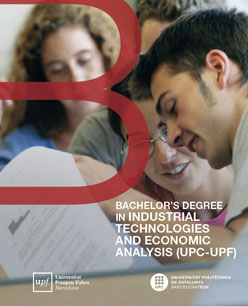Bachelor's degree in Industrial Technologies and Economic Analysis (interuniversity UPC-UPF degree) + master's degree in Industrial Engineering. Sequential academic programme (PARS): Industrial Engineer and Economic Analysis
Barcelona School of Industrial Engineering (ETSEIB)
The bachelor’s degree in Industrial Technologies and Economic Analysis combines industrial engineering topics and the fundamentals of economics to provide high-level interdisciplinary training that will allow you to adapt to new situations and assimilate the future technological developments that will enable businesses to improve their products and processes.
The degree is taught entirely in English at the Universitat Politècnica de Catalunya (UPC) and Pompeu Fabra University (UPF). It responds to the need for new industrial leaders who have both a thorough understanding of innovation and technology and detailed knowledge of economics. It will give you the opportunity to work on innovation projects in placements at national and international companies, as well as excellent employment prospects.
The degree is taught entirely in English at the Universitat Politècnica de Catalunya (UPC) and Pompeu Fabra University (UPF). It responds to the need for new industrial leaders who have both a thorough understanding of innovation and technology and detailed knowledge of economics. It will give you the opportunity to work on innovation projects in placements at national and international companies, as well as excellent employment prospects.
- Professional opportunities
- Supervision and management of projects, facilities, plants, businesses and technology centres in a range of industrial sectors such as energy; iron and steel; metallurgy; chemicals; robotics; the automotive and rail industries; metal, mechanical and electrical construction; and smart materials, nanotechnology and bioengineering.
- Calculation and design of products and processes that have an effect on the economic situation, the business sector , the market and business activities.
- Strategic planning, micro- and macroeconomics, quality management and environmental management.
- Research, development and innovation and the analysis of their implications in the management of products, processes and methods.
- Leadership and management of economic environments undergoing change.
- Economics and management of businesses in regulated sectors and network services.




